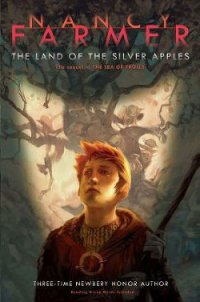Tehanu The Last Book of Earthsea - Le Guin Ursula Kroeber (читать бесплатно книги без сокращений TXT) 📗
She was combing the black goat for the fine underwool that she would spin and take to a weaver to make into cloth, the silky “fleecefell” of Gont Island. The old black goat had been combed a thousand times, and liked it, leaning into the dig and pull of the wire comb-teeth. The grey-black combings grew into a soft, dirty cloud, which Tenar at last stuffed into a net bag; she worked some burrs out of the fringes of the goat’s ears by way of thanks, and slapped her barrel flank companionably. “Bah!” the goat said, and trotted off. Tenar let herself out of the fenced pasture and came around in front of the house, glancing over the meadow to make sure Therru was still playing there.
Moss had shown the child how to weave grass baskets, and clumsy as her crippled hand was, she had begun to get the trick of it. She sat there in the meadow grass with her work on her lap, but she was not working. She was watching Sparrowhawk.
He stood a good way off, nearer the cliff’s edge. His back was turned, and he did not know anyone was watching him, for he was watching a bird, a young kestrel; and she in turn was watching some small prey she had glimpsed in the grass. She hung beating her wings, wanting to flush the vole or mouse, to panic it into a rush to its nest. The man stood, as intent, as hungry, gazing at the bird. Slowly he lifted his right hand, holding the forearm level, and he seemed to speak, though the wind bore his words away. The kestrel veered, crying her high, harsh, keening cry, and shot up and off toward the forests.
The man lowered his arm and stood still, watching the bird. The child and the woman were still. Only the bird flew, went free.
saw the hawk; saw the man; saw the birds come to him, come at his word, at his naming them, come beating their wings to hold his arm with their fierce talons; saw herself the hawk, the wild bird.
“He came to me once as a falcon, a pilgrim falcon,” Ogion had said, by the fire, on a winter day. He had been telling her of the spells of Changing, of transformations, of the mage Bordger who had become a bear. “He flew to me, to my wrist, out of the north and west. I brought him in by the fire here. He could not speak. Because I knew him, I was able to help him; he could put off the falcon, and be a man again, But there was always some hawk in him. They called him Sparrowhawk in his village because the wild hawks would come to him, at his word. Who are we? What is it to be a man? Before he had his name, before he had knowledge, before he had power, the hawk was in him, and the man, and the mage, and more-he was what we cannot name. And so are we all.”
The girl sitting at the hearth, gazing at the fire, listening,
Mice
Townsend, the sheep-buyer who had brought Ogion’s message to the farm in Middle Valley, came out one afternoon to the mage’s house.
“Will you be selling the goats, now Lord Ogion’s gone?”
“I might,” Tenar said neutrally. She had in fact been wondering how, if she stayed in Re Albi, she would get on. Like any wizard, Ogion had been supported by the people his skills and powers served-in his case, anyone on Gont. He had only to ask and what he needed would be given gratefully, a good bargain for the goodwill of a mage; but he never had to ask. Rather he had to give away the excess of food and raiment and tools and livestock and all necessities and ornaments that were offered or simply left on his doorstep. “What shall I do with them?” he would demand, perplexed, standing with his arms full of indignant, squawking chickens, or yards of tapestry, or pots of pickled beets.
But Tenar had left her living in the Middle Valley. She had not thought when she left so suddenly of how long she might stay. She had not brought with her the seven pieces of ivory, Flint’s hoard; nor would that money have been of use in the village except to buy land or livestock, or deal with some trader up from Gont Port peddling pellawi furs or silks of Lorbanery to the rich farmers and little lords of Gont. Flint’s farm gave her all she and Therru needed to eat and wear; but Ogion’s six goats and his beans and onions had been for his pleasure rather than his need. She had been living off his larder, the gifts of villagers who gave to her for his sake, and the generosity of Aunty Moss. Just yesterday the witch had said, “Dearie, my ringneck hen’s brood’s hatched out, and I’ll bring you two-three chickies when they begin to scratch. The mage wouldn’t keep ‘em, too noisy and silly, he said, but what’s a house without chickies at the door?”
Indeed her hens wandered in and out of Moss’s door freely, and slept on her bed, and enriched the smells of the dark, smoky, reeking room beyond belief.
“There’s a brown-and-white yearling nanny will make a fine milch goat,” Tenar said to the sharp-faced man.
“I was thinking of the whole lot,” he said. “Maybe. Only five or six of ‘em, right?”
“Six. They’re in the pasture up there if you want to have a look.”
“I’ll do that.” But he didn’t move. No eagerness, of course, was to be evinced on either side.
“Seen the great ship come in?” he asked.
Ogion’s house looked west and north, and from it one could see only the rocky headlands at the mouth of the bay, the Armed Cliffs; but from the village itself at several places one could look down the steep back-and-forth road to Gont Port and see the docks and the whole harbor. Shipwatching was a regular pursuit in Re Albi. There were generallY a couple of old men on the bench behind the smithy, which gave the best view, and though they might never in their lives have gone down the fifteen zigzag miles of that road to Gont Port, they watched the comings and goings of ships as a spectacle, strange yet familiar, provided for their entertainment.
“From Havnor, smith’s boy said. He was down in Port bargaining for ingots. Come up yesterevening late. The great ship’s from Havnor Great Port, he said.”
He was probably talking to keep her mind off the price of goats, and the slyness of his look was probably simply the way his eyes were made. But Havnor Great Port traded little with Gont, a poor and remote island notable only for wizards, pirates, and goats; and something in the words, “the great ship,” troubled or alarmed her, she did not know why.
“He said they say there’s a king in Havnor now,” the sheep-buyer went on, with a sidelong glance.
“That might be a good thing,” said Tenar.
Townsend nodded. “Might keep the foreign riffraff out.”
Tenar nodded her foreign head pleasantly. “But there’s those down in Port won’t be pleased, maybe.” He meant the pirate sea-captains of Gont, whose control of the northeastern seas had been increasing of late years to the point where many of the old trade-schedules with the central islands of the Archipelago had been disrupted or abandoned; this impoverished everyone on Gont except the pirates, but that did not prevent the pirates from being heroes in the eyes of most Gontishmen. For all she knew, Tenar’s son was a sailor on a pirate ship. And safer, maybe, as such than on a steady merchantman. Better shark than herring, as they said.
“There’s some who’re never pleased no matter what,” Tenar said, automatically following the rules of conversation, but impatient enough with them that she added, rising, “I’ll show you the goats. You can have a look. I don’t know if we’ll sell all or any.” And she took the man to the
broom-pasture gate and left him. She did not like him. It wasn’t his fault that he had brought her bad news once and maybe twice, but his eyes slid, and she did not like his company. She wouldn’t sell him Ogion’s goats. Not even Sippy.
After he had left, bargainless, she found herself uneasy. She had said to him, “I don’t know if we’ll sell,” and that had been foolish, to say we instead of 1, when he hadn’t asked to speak to Sparrowhawk, hadn’t even alluded to him, as a man bargaining with a woman was more than likely to do, especially when she was refusing his offer.




